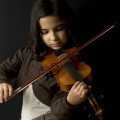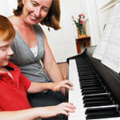The time has finally come—your child has begun to express an interest in music, and the discussion emerges about what instrument to choose. While every instrument has its benefits and appeal, learning to sing provides an excellent introduction to any new student’s musical education and can often be less intimidating than learning an instrument, especially for kids. Additionally, since the only element needed to sing (the voice) is already at hand, singing lessons don’t require the student/ parents to invest in an expensive instrument upfront.
In this article, I’ve articulated both what to expect as well as how to best prepare, and have provided an overview of specific goals accomplished from taking singing lessons for any child and parent new to process. Using this information, I hope to paint an accurate portrait of what singing lessons for kids will both look like and, in time, what voice students will achieve throughout their musical journey.
What to Expect
 Learning to sing requires as much focus and devotion to practice as learning any other instrument—if you feel that your child might be too young to learn an instrument, your child is too young to begin singing lessons as well. That being said, singing lessons for kids are typically structured with a bit more flexibility than lessons in other instruments, potentially making them more appealing to students with no previous musical experience. These structural differences will vary from teacher to teacher, but one of the primary differences is that singing lessons are a very physical experience, and a great deal of attention is paid to posture and breathing technique. These lessons may even involve gentle stretches to warm up the body for healthy singing.
Learning to sing requires as much focus and devotion to practice as learning any other instrument—if you feel that your child might be too young to learn an instrument, your child is too young to begin singing lessons as well. That being said, singing lessons for kids are typically structured with a bit more flexibility than lessons in other instruments, potentially making them more appealing to students with no previous musical experience. These structural differences will vary from teacher to teacher, but one of the primary differences is that singing lessons are a very physical experience, and a great deal of attention is paid to posture and breathing technique. These lessons may even involve gentle stretches to warm up the body for healthy singing.
Singing lessons will introduce the student to general musical concepts and should include music theory in order to build a solid musical foundation and introduce the skills necessary for learning any instrument. Remember—a singer is as much a musician as a pianist or guitarist and should therefore expect to gain as thorough a musical education as an instrumentalist. And just as you would when learning any other instrument, singing lessons for kids should be approached with a balance of consistency and patience.
Ideally, lessons should occur on a weekly basis but shouldn’t exceed 30 or 45 minutes, no matter the experience level. Hour-long singing lessons for kids are incredibly fatiguing and can not only ultimately discourage the student but also cause vocal damage in the long-term. Once matured into mid-to-late teens, voice students can safely approach extended voice lesson lengths.
How to Prepare
Singing lessons for kids typically include both training in vocal warm ups and technical exercises as well as learning new vocal repertoire. While most children go into their first singing lesson expecting the second aspect, learning warm ups and breathing techniques can be met with impatience and frustration, especially if unexpected. While the technical work involved in singing lessons is absolutely necessary, the “work” aspect will begin to disappear as the student observes how improved technique makes the singing experience much more enjoyable and rewarding.
Before your initial singing lesson, complete the following survey both for the student and the teacher’s benefit—the more thoroughly the student can dictate specific or general goals and what he or she enjoys about music and singing, the better the teacher can prepare a successful lesson plan:

- What inspired you to enroll in singing lessons?
- Do you have any previous musical experience, such as lessons in another instrument, chorus in school, church choir, etc.? If so, how long?
(*Note: a lack of any previous musical experience will in no way discourage a potential teacher! Teachers love introducing kids to their first music educational experiences!).
- What styles of music do you enjoy listening to? (Or, who are some of your favorite singers?)
- Are there any specific songs you would love to learn? Are you open to broadening your musical education by learning new/ different styles of songs?
- What are some specific goals you would like to achieve in these singing lessons?
Lesson Goals
Fortunately, the world is heavily saturated with excellent voice teachers to guide your child’s musical education; however, with so many options, it becomes more difficult to decipher which of these teachers will fit the best. While much of the teacher/ student relationship’s success relies on communication and compatibility, I would begin the search by inquiring about the potential teacher’s specific goals for each of his or her singing students. Below, to help direct your teacher inquiry, I’ve listed a few of the long-term goals that any potential student should expect to achieve when enrolling in singing lessons for kids:

- Healthy, comfortable singing posture
- An understanding of breath control
- A healthy, sustainable singing technique, including:
- A thorough understanding of both the low and high vocal registers (chest and head voice)
- An understanding of solfege syllables (or their numerical equivalent)
- Proper diction with an emphasis on vowel pronunciation
- An ability to read music
- Basic ear training skills, such as the ability to aurally identify basic musical intervals and rhythms
- Exposure to multiple genres and styles of vocal music
- Practice in memorization and song preparation for performance
- Performance experience (such as recitals, showcases, talent shows, etc.)
One last note before beginning your search for your child’s next voice teacher—singing lessons will undeniably benefit any potential student in several unexpected, wonderful ways. These lessons should be treated, first and foremost, as a source of joy and nourishment for the imagination, not as training to become the next singing sensation. Singing lessons for kids doesn’t just offer an education in music; these lessons will help the singer access his or her own vulnerability beyond any other standard educational platform, empowering the singer to create on a regular basis and build a sense of confidence that will add value to all aspects of his or her life.







